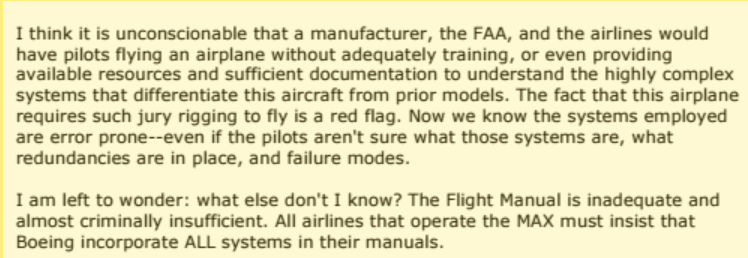Originally Posted by
DenverBrian
The pilots in
this document say quite different things. Several instances of this system forcing an unexpected nose-down event. Were I a passenger on those flights, it would be anything from anxious to scary, depending on how quickly the pilots could correct the situation. And they shouldn't have to. Planes simply shouldn't do this.
Most worrisome is this passage from the docs. This is a 737MAX pilot:

Suffice to say the journalist who queried the ASRS database is no Bob Woodward... it's public record and I had occasion to read each of the 19 current entries regarding issues with the 737MAX series. A few notable findings:
- ACN 1593017 (the 'smoking gun' cited in the news article above) submitted in November 2018, lists a litany of complaints, post-Lion Air, about the MCAS system and pilot training on the MAX, but notably,
does not actually involve a flight, or any specific, experienced anomaly, which is generally a prerequisite, but not mandatory, for an ASRS report. Instead, it reads more like a disgruntled (AA or WN) pilot venting his concerns... most of which, meanwhile, have been corrected in subsequent manual and checklist releases, see the lines which immediately precede the quoted bit, emphasis mine:
This description is not currently in the 737 Flight Manual Part 2, nor the Boeing FCOM, though it will be added to them soon. This communication highlights that an entire system is not described in our Flight Manual. This system is now the subject of an AD.
- the most "damning" actual inflight report (ACN 1597380) involves an uncommanded descent during cruise, which was immediately identified and corrected with no further issues, while
autopilot was engaged. Autopilot on = no MCAS, so no immediately-apparent link to the Lion Air crash, which would support an argument that the type should be grounded
- another (ACN 1593701) discusses an uncommanded level-off during VNAV autopilot mode, at cruise, when a climb was instructed by ATC. The reporting pilot noted human errors. Again, autopilot was engaged in a different phase of flight than the Lion Air or Ethiopian cases, so no MCAS and not any sort of evidence as to why the MAX should be grounded
- ACN 1590012 involves an autothrottle anomaly during initial climb, that was identified and immediately corrected by the pilot. I'm not sure if MCAS is active when autothrottles are engaged, but A/T has not been cited as causal in the Lion Air crash
This is yet another example of not putting a great deal of faith in the technical accuracy of general media reporting on aviation accidents.
Originally Posted by
n198ua
I asked this upthread and I'm not sure I was answered directly, so here goes. If you're a pilot flying the Max and the MCAS engages and you're thinking "whoa, we don't want the MCAS here, this is not going to end well"; can you simply reach up, flip a toggle switch, and fly the damn thing manually ?
For the MCAS to engage as designed, the airplane is being flown manually. If a pilot receives unwanted stabilizer trim inputs that do not abate after applying counter trim, then, ordinarily, a runaway stabilizer checklist is completed, which will discontinue any automatic trim function (on the MAX, either speed trim or MCAS). To disable the MCAS, a pilot can alternatively engage the autopilot or select flaps 1. By design, that cuts out the MCAS logic.